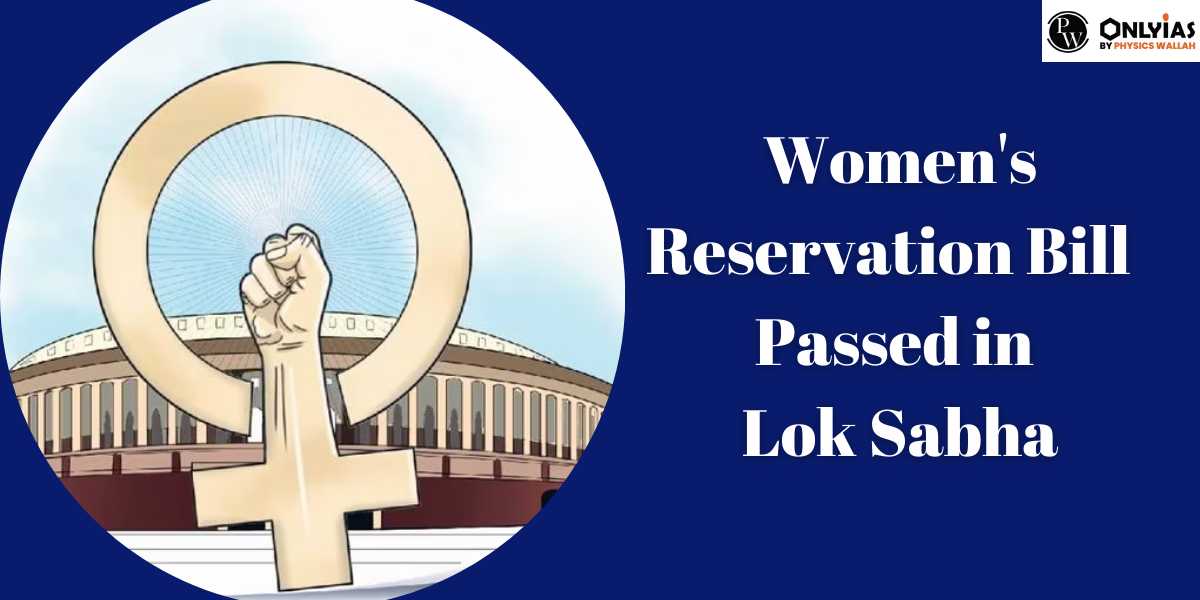![]() Madhavi Gaur
Madhavi Gaur
![]() September 21, 2023 11:22
September 21, 2023 11:22
![]() 5346
5346
![]() 0
0
Women's Reservation Bill: The Women's Reservation Bill was put to vote in the Lok Sabha, and passed with a resounding majority with 454 votes in favor.

The Women’s Reservation Bill, often referred to as the Women’s Reservation Bill, is a proposed piece of legislation in India aimed at increasing the representation of women in the Indian Parliament and State Legislative Assemblies. The bill seeks to reserve a certain percentage of seats in these legislative bodies exclusively for women.
The proposed legislation, known as the Constitution (One Hundred and Eighth Amendment) Bill of 2008, aims to set aside a third of the seats in the Lok Sabha and state legislative assemblies for women. The distribution of these reserved seats will be decided by the authority designated by Parliament. Additionally, one-third of the seats reserved for Scheduled Castes and Scheduled Tribes in the Lok Sabha and legislative assemblies will be specifically allocated to women from these groups. These reserved seats may be rotated among various constituencies within the state or union territory.
Also Read:
The bill’s objective is to promote gender equality in the political sphere and empower women to actively participate in the democratic process. However, its passage into law has been a subject of ongoing debate and discussion in India’s political landscape.
The Rajya Sabha, approved the women’s reservation bill unanimously following an extensive 11-hour deliberation. The Women’s Reservation Bill passed in Rajya Sabha with 215 votes. The Lok Sabha had previously passed this bill. Consequently, the law mandating a 33% reservation for women in both the Lok Sabha and state assemblies will be enacted, pending the completion of the census and delimitation process, a point of contention raised by the Opposition. Remarkably, only two MPs from the AIMIM opposed the bill in the Lok Sabha, and there were no abstentions in the Rajya Sabha when the vote for the Nari Shakti Vandan Adhiniyam bill took place.
This marks the inaugural bill to be approved in the new Parliament building. Following its clearance in the Upper House, Rajya Sabha chairman Jagdeep Dhankhar extended his congratulations to the members, hailing it as a historic achievement. “Historic achievement, congratulations. It is also noteworthy that today is PM Modi’s birthday by the Hindu calendar,” Dhankhar remarked after the bill’s passage.
Having been passed in both the Lok Sabha and the Rajya Sabha, the bill will now proceed to the President for approval. Once granted, the official enactment of the 33% reservation for women in the Lok Sabha and state assemblies will follow.
Women’s Reservation Bill: For twenty-seven years, the Women’s Reservation Bill has been a topic of discussion in the Indian Parliament. However, a significant development occurred on September 20 when the Lok Sabha took a momentous step towards gender equality in politics. The Women’s Reservation Bill was put to vote in the Lok Sabha, and passed with a resounding majority with 454 votes in favor.
On Wednesday, September 20, the Lok Sabha passed a significant bill that advocates reserving one-third of all seats for women in the Lok Sabha, state legislatures, and the Delhi legislative assembly. The Constitution (One Hundred and Twenty-Eighth Amendment) Bill 2023, presented by Union Law Minister Arjun Ram Meghwal on the second day of the special parliamentary session, secured passage with a two-thirds majority of the members present and voting in the Lok Sabha.
With an almost unanimous show of support, the Lok Sabha passed the Constitution (One Hundred and Twenty Eighth) Bill 2023, aiming to amend the Constitution. The Bill seeks to provide one-third reservation for women in both the Lok Sabha and State Assemblies.
The Bill now proceeds to the Rajya Sabha, where its fate will be determined during the remaining two days of the Special Session of Parliament. Additionally, it may require approval from at least half of the Indian States.
Prime Minister Narendra Modi expressed his appreciation for the Lok Sabha members’ efforts in passing what he called a “historic legislation.” The bill’s near-unanimous support was a significant achievement.
Only two members, namely Asaduddin Owaisi and Syed Imtiyaz Jaleel of the All India Majlis-E-Ittehadul Muslimeen, opposed the Bill, highlighting the contentious nature of the debate.
During the voting process, which lasted nearly two hours, members manually cast their votes using paper slips, a method chosen for this critical decision.
The eight-hour-long debate witnessed robust exchanges between Treasury and Opposition members, particularly those from the Congress. One key point of contention was the question of who should receive credit for this landmark Bill. Additionally, discussions revolved around the possibility of a separate quota for women from other backward classes (OBCs).
In a notable shift from its 2010 stance, the Congress demanded a separate quota within the quota for OBCs after conducting a caste census. Sonia Gandhi, the Congress leader who initiated the debate, emphasized the need for immediate Bill implementation without linking it to a frozen delimitation exercise.
Home Minister Amit Shah countered the demand for a separate OBC quota, highlighting the BJP’s significant representation of OBC lawmakers, including a Prime Minister from the same community, Narendra Modi.
Mr. Shah explained that the decision to implement reservation after delimitation was to ensure that the Delimitation Commission, a quasi-judicial body, could decide, following public consultation, which seats should be reserved. He raised concerns about the potential consequences of “political reservation.”
Law Minister Arjun Ram Meghwal expressed concerns about immediate reservation, stating that it might contradict the Constitution’s provisions and could be legally challenged. The government’s commitment to avoiding technical obstacles was highlighted.
The Lok Sabha debate involved the participation of 60 members, with 27 of them being women MPs. However, the voting process was protracted because electronic voting was not feasible due to some political parties not yet providing specific seat allotments to individual members.
The Women’s Reservation Bill, which seeks to reserve one-third of the seats in the Lok Sabha (the lower house of the Indian Parliament) and State Legislative Assemblies for women, has faced numerous challenges and hurdles that have prevented its passage in the Lok Sabha. Here are some of the key reasons why the bill has not been passed:
Upon the implementation of the Women’s Reservation Bill, a significant transformation in India’s electoral landscape is anticipated. The forthcoming census and delimitation process, preceding the reservation’s enactment, is poised to expand the Lok Sabha’s seat count from 543 to an impressive 753. The most substantial increase is expected in Uttar Pradesh, already a major contributor of Members of Parliament (MPs) to Parliament. Meanwhile, the southern states may experience only marginal growth, potentially diminishing their representation and electoral influence.
The Women’s Reservation Bill is a significant and often debated topic in the context of the Union Public Service Commission (UPSC) and its Civil Services Examination (CSE). Here’s how the Women’s Reservation Bill is relevant to UPSC aspirants:
1. Potential Essay or General Studies Paper Topic: The Women’s Reservation Bill can be a relevant topic for the essay paper (Paper-I) of the UPSC Mains examination. Aspirants may be asked to write essays on topics related to gender equality, empowerment of women, and social issues. Analyzing the implications and challenges associated with the Women’s Reservation Bill can be a valuable perspective in such essays.
2. Gender Equality and Social Justice: The Women’s Reservation Bill relates to the broader themes of gender equality and social justice, which are integral to the UPSC syllabus. Aspirants preparing for the General Studies papers (especially GS Paper-II, which covers topics related to governance, constitution, and social justice) should be familiar with the bill and its significance in addressing gender disparities in political representation.
3. Current Affairs and Policy Analysis: UPSC aspirants are expected to stay updated with current affairs and analyze various government policies and bills. The Women’s Reservation Bill, if it becomes a law, would have significant implications for India’s political landscape. Aspirants may need to analyze the bill’s provisions, potential impact, and challenges in the context of policy and governance.
4. Gender and Development Studies: UPSC candidates opting for optional subjects like Sociology, Political Science, or Gender Studies may find the Women’s Reservation Bill highly relevant. It can be discussed in the context of gender studies, political participation, and the impact of such policies on society.
5. Women’s Empowerment and Grassroots Governance: Understanding the Women’s Reservation Bill is crucial for candidates interested in the role of women in grassroots governance and panchayati raj institutions. Questions related to women’s empowerment and their participation in local governance can be influenced by the discussions around this bill.
6. Ethical and Moral Issues: In the Ethics, Integrity, and Aptitude paper (GS Paper-IV), candidates may encounter case studies or questions related to gender-based ethical dilemmas. Familiarity with the Women’s Reservation Bill and its ethical implications can be valuable in answering such questions.
The UPSC aspirants should be aware of its provisions, debates, and potential impact, as it can be relevant across various stages of the examination, from the preliminary to the mains and the interview.
<div class="new-fform">
</div>

Latest Comments